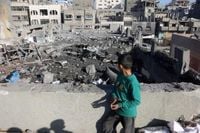In a stark and controversial statement, Israeli Finance Minister Bezalel Smotrich declared on May 6, 2025, that the Gaza Strip would be "totally destroyed" following the ongoing conflict between Israel and Hamas. Speaking at a conference in the Israeli settlement of Ofra, located in the occupied West Bank, Smotrich painted an apocalyptic picture of the aftermath of the war, suggesting that the region would be left in ruins.
Smotrich's comments come just two days after the Israeli security cabinet approved a plan aimed at the conquest of Gaza. He stated, "In a few months, we can declare that we have won. Gaza will be totally destroyed." This declaration reflects a hardline stance that has become increasingly prominent within the Israeli government.
During his address, Smotrich elaborated on his vision for the future of Gaza, asserting that in six months, Hamas would cease to exist as a functional entity. He indicated that the population of Gaza would be concentrated in the southern part of the territory, specifically south of the Morag corridor. He described the remainder of Gaza as likely to be empty, saying, "The population of Gaza will be concentrated south of the Morag corridor. The rest of the territory will be empty." The Morag axis, which cuts across the strip from east to west, isolates the city of Rafah from Khan Younès to the north, effectively dividing the region.
Smotrich's remarks have raised alarm among humanitarian organizations and observers, who worry about the implications for the civilian population of Gaza. He suggested that the citizens would be left in despair and would seek to relocate to start a new life elsewhere. "They will be totally desperate, understand that there is no hope or anything to expect from this territory, and will look to relocate to begin a new life elsewhere," he stated.
Earlier in March, Smotrich had announced the establishment of a "migration administration" intended to facilitate the displacement of Gazans. This initiative has drawn criticism, as it raises questions about the rights and welfare of the people affected by the conflict.
In a separate but related issue, Smotrich addressed the contentious topic of the Israeli occupation of Gaza. He told Israeli Channel 12 that Israelis should not feel ashamed of using the term "occupation" in reference to Gaza and asserted that there would be no withdrawal from the territories that have been conquered, even in exchange for hostages. This statement has further inflamed tensions, as it suggests a long-term commitment to maintaining control over the region.
On the same day, the Forum of Families, which represents relatives of hostages held by Hamas, accused the Israeli government of "sacrificing" the hostages in light of the recent military decisions. They criticized the government for prioritizing military objectives over the safety of the hostages, stating that the expansion of the offensive in Gaza was tantamount to abandoning those held captive.
Adding to the complexity of the situation, former U.S. President Donald Trump had previously suggested in early February the idea of a U.S. takeover of Gaza to facilitate its reconstruction, envisioning it as a "Riviera of the Middle East." Trump proposed that the inhabitants of Gaza could be relocated to Egypt and Jordan, a suggestion that these countries promptly rejected.
As international leaders prepare for a Middle Eastern tour, with Trump expected to visit from May 13 to 16, the situation in Gaza remains dire. Humanitarian organizations have expressed concerns about the escalating violence and the humanitarian crisis unfolding in the region. The United Nations has called for an urgent ceasefire and for all parties to prioritize the safety and well-being of civilians caught in the conflict.
The ongoing military actions and the rhetoric surrounding them have led to widespread condemnation from various quarters, including human rights advocates and international observers. The situation in Gaza is not only a humanitarian crisis but also a geopolitical flashpoint that could have repercussions far beyond the immediate area.
As the conflict continues to evolve, the international community watches closely, urging for dialogue and peaceful resolutions. The statements made by Israeli officials, particularly those like Smotrich, highlight the deep divisions and challenges that lie ahead in achieving lasting peace in the region.
With the fate of Gaza hanging in the balance, the coming weeks will be critical in determining the future of the enclave and its people. The world awaits to see whether diplomatic efforts will prevail or if the cycle of violence will continue unabated.




